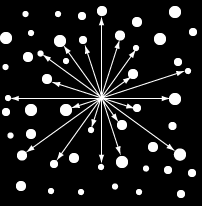Olber's Paradox: Why is the Sky Dark at Night?
 | If the universe were infinite and filled with stars in a uniform distribution, then every line of sight would terminate on the surface of a star and should be bright. To be sure, those further away would be fainter, but there would be more of them. Careful analysis suggests that the sky should be as bright as the surface of an average star. |
Noting that the night sky is obviously not that bright, there are two lines of explanation. First, the universe appears to be of finite age and that light from stars at an infinite distance would not have reached us in the age of the universe. Second, we observe that the universe is expanding and that stars further away from us are receding at a faster rate. The result of this expansion is that the light from more distant stars is Doppler shifted more toward the red and beyond a certain distance would not contribute significantly in the visible region of the electromagnetic spectrum.
Star concepts
Reference
Shu
Ch 16
| HyperPhysics***** Astrophysics | R Nave |